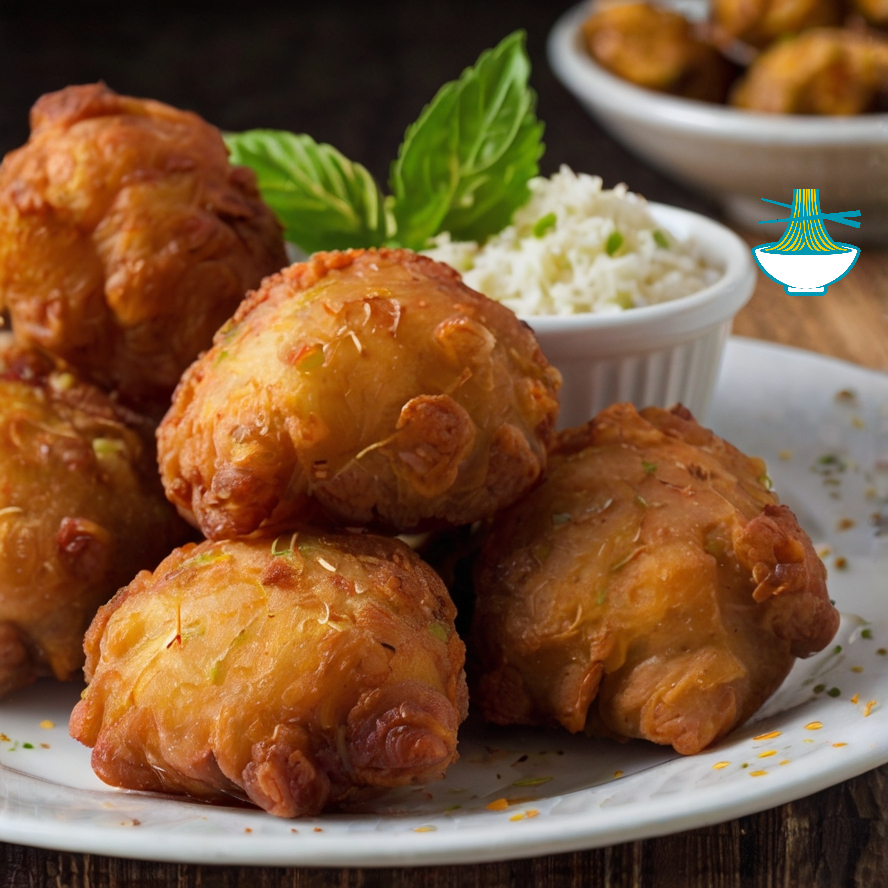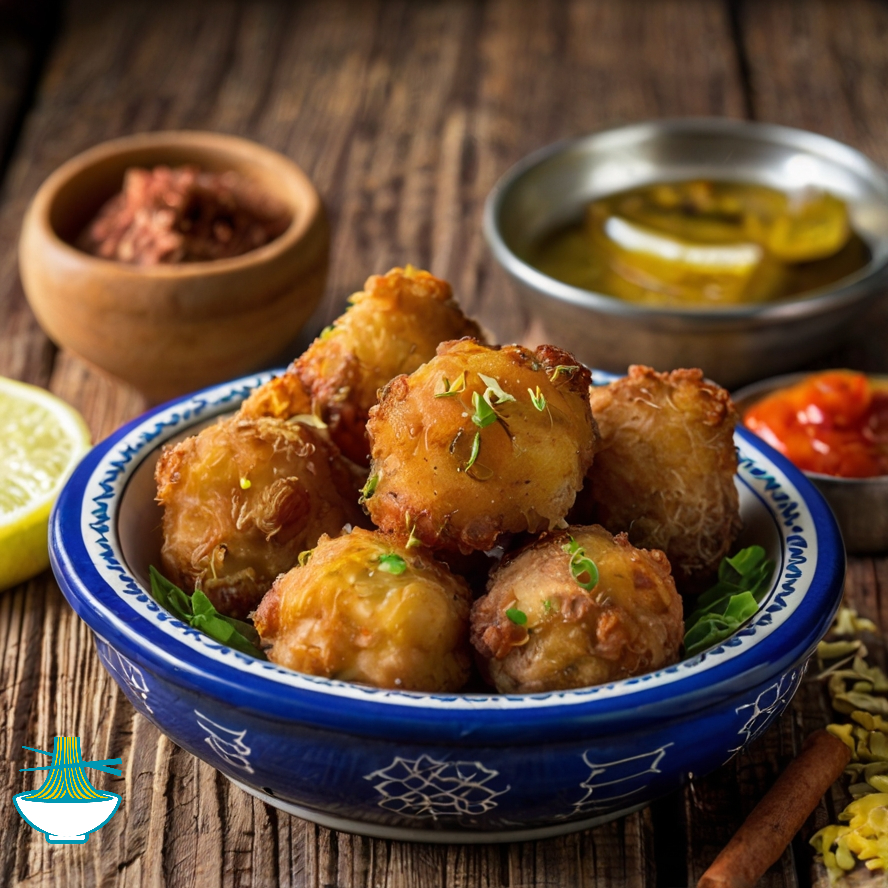Cuban Fried Pork Dough, known as "Masitas de Cerdo Fritas" in Spanish, is a cherished Cuban appetizer or snack. This dish features bite-sized pork pieces marinated in a blend of spices and citrus juices, then coated in a seasoned dough and deep-fried to a crispy perfection. The result is a flavorful and crunchy treat that’s perfect for sharing.

Masitas de Cerdo Fritas have deep roots in Cuban cuisine, reflecting the island’s love for bold flavors and rich textures. This dish embodies the essence of Cuban cooking with its use of aromatic spices and citrus, which are staples in many traditional Cuban recipes. The technique of frying pork in a seasoned dough is inspired by various Caribbean and Latin American cooking traditions, offering a unique twist on classic fried foods.
Ingredients:
- 1 lb pork shoulder or tenderloin, cut into bite-sized pieces
- 3 cloves garlic, minced
- 1 tsp dried oregano
- 1 tsp cumin
- 1 tsp salt
- 1/2 tsp black pepper
- 1/4 cup orange juice
- 1/4 cup lime juice
- 1/4 cup olive oil
- 2 cups all-purpose flour
- 2 tsp baking powder
- 1 tsp salt
- 1/2 tsp black pepper
- 1/4 cup vegetable shortening
- 1/2-3/4 cup water
- Vegetable oil for frying
Directions:
1. Marinate the Pork:
- In a large bowl, mix pork pieces with garlic, oregano, cumin, salt, and black pepper.
- Add orange juice, lime juice, and olive oil. Stir to coat the pork thoroughly.
- Cover and refrigerate for at least 2 hours, or overnight for best results.
2. Prepare the Dough:
- In a separate bowl, combine flour, baking powder, salt, and black pepper.
- Cut in vegetable shortening until the mixture resembles coarse crumbs.
- Gradually add water, mixing until a soft dough forms.
3. Heat Oil:
- Heat vegetable oil in a deep fryer or large heavy pot to 350°F (175°C).
4. Coat and Fry:
- Coat each marinated pork piece in the dough, ensuring an even coverage.
- Fry coated pork pieces in the hot oil, being careful not to overcrowd the pot. Cook for 4-5 minutes or until golden brown and crispy.
- Use a slotted spoon to transfer fried pork to a paper towel-lined plate to drain excess oil.
5. Serve:
- Serve hot, garnished with lime wedges and fresh herbs if desired.
Notes:
- Adjust spices and seasoning to taste. For variation, try using chicken or beef instead of pork.

Nutrition Value:
1. 1 lb pork shoulder or tenderloin, cut into bite-sized pieces
- Calories: 700-800
- Carbohydrates: 0 g
- Protein: 65-70 g
- Fat: 50-60 g
- Sodium: 120-150 mg
- Cholesterol: 200-250 mg
- Vitamins: B12, B6, niacin, riboflavin
- Minerals: Iron, zinc, phosphorus
- Nutritional Benefit: Pork is a rich source of protein, essential for muscle building and repair. It provides several important vitamins and minerals, including B vitamins for energy production and iron for oxygen transport in the blood.
2. 3 cloves garlic, minced
- Calories: 12
- Carbohydrates: 3 g
- Protein: 0.5 g
- Fat: 0 g
- Sodium: 1 mg
- Cholesterol: 0 mg
- Vitamins: Vitamin C, vitamin B6
- Minerals: Manganese, calcium, potassium
- Nutritional Benefit: Garlic contains compounds with potential antioxidant and anti-inflammatory properties. It supports immune function and cardiovascular health.
3. 1 tsp dried oregano
- Calories: 5
- Carbohydrates: 1 g
- Protein: 0.2 g
- Fat: 0 g
- Sodium: 0 mg
- Cholesterol: 0 mg
- Vitamins: Vitamin K, vitamin A
- Minerals: Calcium, iron, magnesium
- Nutritional Benefit: Oregano is rich in antioxidants and can aid in digestion. It also has antimicrobial properties that may benefit overall health.
4. 1 tsp cumin
- Calories: 8
- Carbohydrates: 1 g
- Protein: 0.4 g
- Fat: 0.4 g
- Sodium: 0 mg
- Cholesterol: 0 mg
- Vitamins: Vitamin C, vitamin E
- Minerals: Iron, magnesium, manganese
- Nutritional Benefit: Cumin provides iron, which is important for red blood cell production, and has potential digestive benefits and antioxidant properties.
5. 1 tsp salt
- Calories: 0
- Carbohydrates: 0 g
- Protein: 0 g
- Fat: 0 g
- Sodium: 2,300 mg
- Cholesterol: 0 mg
- Vitamins: None
- Minerals: Sodium
- Nutritional Benefit: Salt is essential for maintaining fluid balance and nerve function. However, excessive salt intake can contribute to high blood pressure.
6. 1/2 tsp black pepper
- Calories: 3
- Carbohydrates: 1 g
- Protein: 0.1 g
- Fat: 0 g
- Sodium: 1 mg
- Cholesterol: 0 mg
- Vitamins: Vitamin K
- Minerals: Manganese, iron
- Nutritional Benefit: Black pepper contains piperine, which may enhance the absorption of other nutrients and has potential anti-inflammatory and antioxidant effects.
7. 1/4 cup orange juice
- Calories: 30
- Carbohydrates: 7 g
- Protein: 0.5 g
- Fat: 0 g
- Sodium: 1 mg
- Cholesterol: 0 mg
- Vitamins: Vitamin C, folate
- Minerals: Potassium, calcium
- Nutritional Benefit: Orange juice is high in vitamin C, which supports immune function and skin health, and provides potassium for heart health.
8. 1/4 cup lime juice
- Calories: 15
- Carbohydrates: 4 g
- Protein: 0.2 g
- Fat: 0 g
- Sodium: 0 mg
- Cholesterol: 0 mg
- Vitamins: Vitamin C
- Minerals: Potassium
- Nutritional Benefit: Lime juice is rich in vitamin C and antioxidants, aiding in digestion and immune function.
9. 1/4 cup olive oil
- Calories: 480
- Carbohydrates: 0 g
- Protein: 0 g
- Fat: 54 g
- Sodium: 0 mg
- Cholesterol: 0 mg
- Vitamins: Vitamin E, vitamin K
- Minerals: Iron
- Nutritional Benefit: Olive oil is a source of monounsaturated fats, which are heart-healthy and have anti-inflammatory properties. It also contains antioxidants.
10. 2 cups all-purpose flour
- Calories: 910
- Carbohydrates: 190 g
- Protein: 24 g
- Fat: 2 g
- Sodium: 2 mg
- Cholesterol: 0 mg
- Vitamins: B vitamins (thiamine, riboflavin, niacin)
- Minerals: Iron, magnesium
- Nutritional Benefit: Flour provides carbohydrates for energy and some protein. It also contains B vitamins, which are important for metabolism.
11. 2 tsp baking powder
- Calories: 6
- Carbohydrates: 1 g
- Protein: 0 g
- Fat: 0 g
- Sodium: 500 mg
- Cholesterol: 0 mg
- Vitamins: None
- Minerals: Sodium, calcium
- Nutritional Benefit: Baking powder helps leaven baked goods, creating a lighter texture. However, it adds sodium to the diet.
12. 1 tsp salt
- Calories: 0
- Carbohydrates: 0 g
- Protein: 0 g
- Fat: 0 g
- Sodium: 2,300 mg
- Cholesterol: 0 mg
- Vitamins: None
- Minerals: Sodium
- Nutritional Benefit: Salt is necessary for electrolyte balance but should be used in moderation.
13. 1/2 tsp black pepper
- Calories: 1.5
- Carbohydrates: 0.5 g
- Protein: 0.05 g
- Fat: 0 g
- Sodium: 0.5 mg
- Cholesterol: 0 mg
- Vitamins: Vitamin K
- Minerals: Manganese, iron
- Nutritional Benefit: Black pepper can enhance the flavor of foods and may aid in nutrient absorption and digestive health.
14. 1/4 cup vegetable shortening
- Calories: 450
- Carbohydrates: 0 g
- Protein: 0 g
- Fat: 50 g
- Sodium: 0 mg
- Cholesterol: 0 mg
- Vitamins: None
- Minerals: None
- Nutritional Benefit: Vegetable shortening is used to create a tender texture in doughs but is high in fat and should be used sparingly.
15. 1/2-3/4 cup water
- Calories: 0
- Carbohydrates: 0 g
- Protein: 0 g
- Fat: 0 g
- Sodium: 0 mg
- Cholesterol: 0 mg
- Vitamins: None
- Minerals: None
- Nutritional Benefit: Water is essential for hydration and helps in forming the dough.
16. Vegetable oil for frying
- Calories: 120 per tablespoon
- Carbohydrates: 0 g
- Protein: 0 g
- Fat: 14 g
- Sodium: 0 mg
- Cholesterol: 0 mg
- Vitamins: None
- Minerals: None
- Nutritional Benefit: Vegetable oil is used for frying and adds calories and fat to the dish. It's important to use in moderation and choose oils with higher smoke points for frying.


Comments